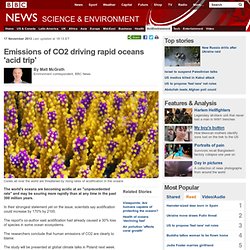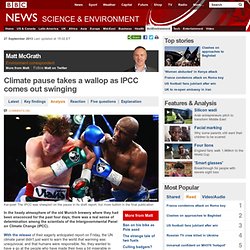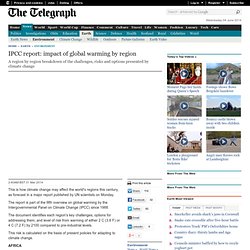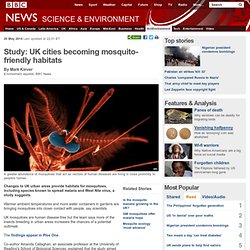

William Hague: Climate Change: Why the Government Must Meet the Challenge. Under this Coalition government, the Foreign Office has a renewed sense of mission.

It is a mission to promote Britain's national interest, while tirelessly working for a world which is more secure, more stable, more free and more prosperous. In no area is this more relevant than the fight against climate change. Today ministers from more than 20 countries will meet in London with the goal of speeding up global progress on clean energy. I am in no doubt that we must meet this challenge, not only to safeguard the sustainability of our planet and the security of our energy, but also to ensure we are at the front of the queue when it comes to the jobs and industries of the future.
Carbon Mitigation Initiative: Stabilization Wedges Game. Stabilization Wedges Game Game Resources Seven Ways to Reduce Carbon A musical lecture by Glenn Wolkenfeld based on the stablization wedges.Video | Lyrics (PDF) The Stabilization Wedges Game is a team-based exercise that teaches players about the scale of the greenhouse gas problem, plus technologies that already exist to dramatically reduce our carbon emissions and get us off the path toward dramatic and damaging climate change.

Players pick eight carbon-cutting strategies to construct a carbon mitigation portfolio, filling in the eight wedges of the stabilization triangle. The game has been used with players from variety of groups, from university researchers to industry professionals to high school students, and we'd like to help you play with your class or organization: A Teachers' Guide oriented toward upper-level high school instructors is available, with student game materials in 8.5" x 11" format. Emissions of CO2 driving rapid oceans 'acid trip' 17 November 2013Last updated at 18:13 ET By Matt McGrath Environment correspondent, BBC News Corals all over the world are threatened by rising rates of acidification in the oceans The world's oceans are becoming acidic at an "unprecedented rate" and may be souring more rapidly than at any time in the past 300 million years.

In their strongest statement yet on the issue, scientists say acidification could increase by 170% by 2100. The report's co-author said acidification had already caused a 30% loss of species in some ocean ecosystems. The researchers conclude that human emissions of CO2 are clearly to blame. The study will be presented at global climate talks in Poland next week. In 2012, over 500 of the world's leading experts on ocean acidification gathered in California. Continue reading the main story “Start Quote You don't find a mollusc at the ph level expected for 2100, this is really quite a stunning fact” End QuoteProf Jean-Pierre GattusoCNRS Pickled waters.
Climate pause takes a wallop as IPCC comes out swinging. 27 September 2013Last updated at 15:02 ET Ker-pow!

The IPCC was sheepish on the pause in its draft report; but more bullish in the final publication In the heady atmosphere of the old Munich brewery where they had been ensconced for the past four days, there was a real sense of determination among the scientists of the Intergovernmental Panel on Climate Change (IPCC). With the release of their eagerly anticipated report on Friday, the UN climate panel didn't just want to warn the world that warming was unequivocal, and that humans were responsible. No, they wanted to have a go at the people who have made their lives a bit miserable in recent times, the climate sceptics and deniers. And while not renowned for their skills in matters pugilistic, at the launch of the summary for policymakers in Stockholm, the grey men definitely came out swinging. But over the four days of negotiations with governments here in the Swedish capital, the UN body discovered its backbone.
Come and have a go... The ultimate climate change FAQ. IPCC report: impact of global warming by region. Challenge: Water stress Risk: High at 2 C, very high at 4 C Options: Smarter use of water resources Challenge: Food shortages Risk: Very high at 2 C and 4 C Options: Stress-tolerant crops, help for small farmers Challenge: Mosquito- and water-borne diseases Risk: Very high at 2 C and 4 C Option: Outbreak early-warning systems, improved sanitation.

Study: UK cities becoming mosquito-friendly habitats. 20 May 2014Last updated at 22:01 ET By Mark Kinver Environment reporter, BBC News A greater abundance of mosquitoes that act as vectors of human diseases are living in close proximity to people's homes Changes to UK urban areas provide habitats for mosquitoes, including species known to spread malaria and West Nile virus, a study suggests.

Warmer ambient temperatures and more water containers in gardens are bringing mosquitoes into closer contact with people, say scientists.